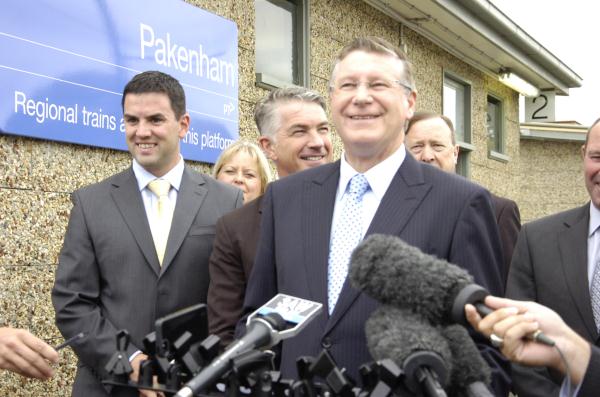
By CAM LUCADOU-WELLS
CRITICS are pondering the value of a $2 billion-plus upgrade of the overcrowded Cranbourne-Pakenham rail corridor – which will be funded under a public-private partnership (PPP).
The State Government announced in its 2014-15 budget last week that the project would be finished in five years.
According to the budget papers, the State Government has allocated just $56 million over four years towards the $2-2.5 billion project which is estimated to increase the corridor’s capacity by 30 per cent.
Reports suggest the project’s real cost may be more than $5 billion, which will be paid to the private consortium of partners that includes Metro Trains.
The repayments are reportedly up to $1 million a day for the next 20 years.
Another reported aspect of the PPP is developers being handed land at grade separation sites.
Opposition Public Transport spokeswoman Jill Hennessy said the government appeared to have “ditched proper planning process in a desperate bid for votes”.
Public Transport Users Association president Dr Tony Morton said the project had “substantial value” for the rail corridor but would be better value if it was a public project with “conventional debt financing”.
“It, basically, hands over planning responsibility to the private sector, with the public interest a subsidiary consideration.
“This means the planning may not adequately consider elements like good bus interchanges at stations, that serve the public interest but do not assure a financial return to the project proponents.”
Professor Graham Currie of Monash University’s Institute of Transport Studies said Metro Trains’s PPP in Hong Kong had worked well but it was unclear what the “real detail” of the Victorian PPP could be.
“Metro Trains (in Hong Kong) makes money because it develops the property around the station.
“A key question is whether the community here is happy to give this land away to developers.”
The government has announced it is entering “exclusive negotiations” with the private consortium, hoping to finalise an agreement by late this year subject to “a positive value for money outcome”.
The project includes 25 new trains, high-capacity signalling and the removal of at least four level crossings.
A spokeswoman for Premier Denis Napthine didn’t elaborate on the project’s ultimate cost.
She said taxpayers won’t “need to start paying” before the project is finished by the consortium and passengers “therefore see the full benefits of the package”.
“Passengers using the Cranbourne-Pakenham service will see benefits before the project is complete including the removal of level crossings and the delivery of the new next generation trains.”
The rail corridor’s trains are Melbourne’s most congested, with a forecast increase in commuters of 4.3 per cent a year.
In a PTV passenger load report, 12 peak services a day were overcrowded beyond benchmark levels.
Professor Currie said congestion would get worse until the upgrade is expected to be completed in 2019.
The opposition has criticised plans for the Cranbourne-Pakenham corridor’s commuters missing the City Loop and being offloaded at Southern Cross station on the furthest side of the CBD.
Public Transport Minister Terry Mulder said changing trains “already happens every day in Melbourne, as not every train goes direct to Flinder Street or via the City Loop.”






